University: Psychological Intervention in Cancer Patient Distress
VerifiedAdded on 2023/03/23
|48
|11028
|26
Report
AI Summary
This report presents a systematic review investigating the effectiveness of psychological interventions designed to minimize psychological distress in cancer patients. The research focuses on interventions such as Cognitive Behavioral Therapy (CBT) and Acceptance and Commitment Therapy (ACT) within oncology units. The review, adhering to PRISMA guidelines, analyzed articles from databases like MEDLINE and PubMed, considering studies within the last ten years. The study included cancer patients of all age groups, comparing various interventions and assessing methodological quality using the AMSTAR tool. The findings highlight the positive outcomes of CBT and ACT in managing behavioral changes, distress, and anxiety. The review emphasizes the need for psychological interventions in oncology care to improve the quality of life for cancer patients, despite the need for further research to strengthen the evidence base.
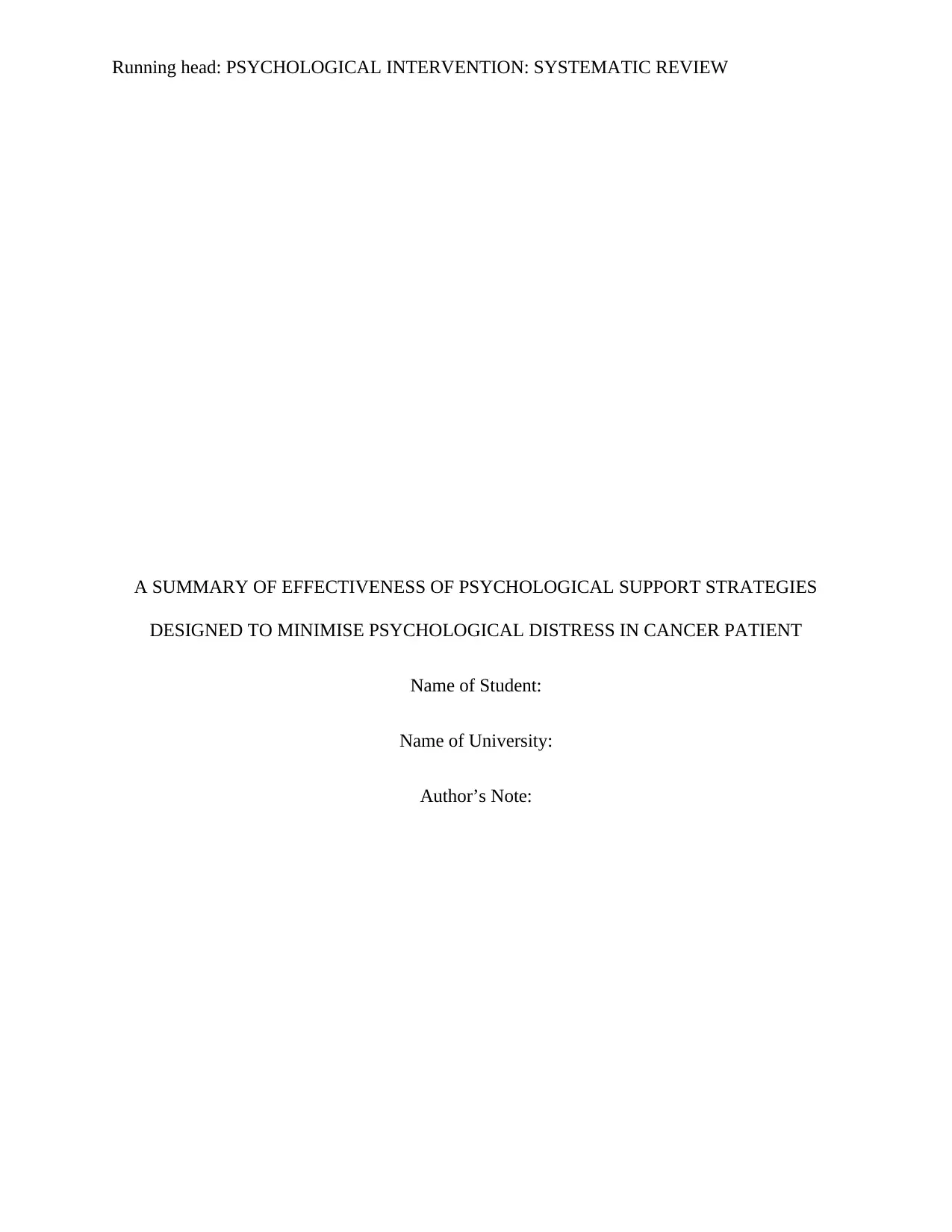
Running head: PSYCHOLOGICAL INTERVENTION: SYSTEMATIC REVIEW
A SUMMARY OF EFFECTIVENESS OF PSYCHOLOGICAL SUPPORT STRATEGIES
DESIGNED TO MINIMISE PSYCHOLOGICAL DISTRESS IN CANCER PATIENT
Name of Student:
Name of University:
Author’s Note:
A SUMMARY OF EFFECTIVENESS OF PSYCHOLOGICAL SUPPORT STRATEGIES
DESIGNED TO MINIMISE PSYCHOLOGICAL DISTRESS IN CANCER PATIENT
Name of Student:
Name of University:
Author’s Note:
Paraphrase This Document
Need a fresh take? Get an instant paraphrase of this document with our AI Paraphraser
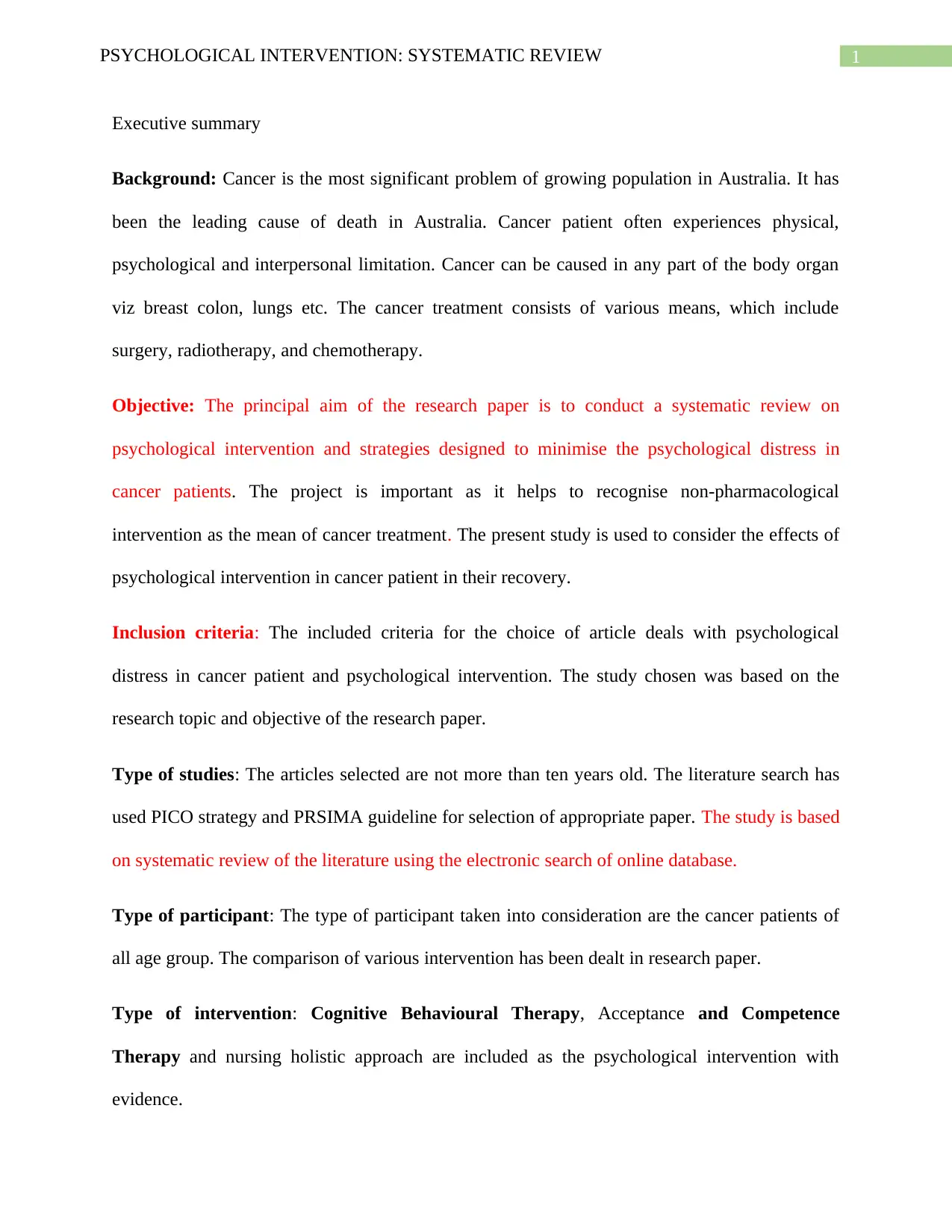
1PSYCHOLOGICAL INTERVENTION: SYSTEMATIC REVIEW
Executive summary
Background: Cancer is the most significant problem of growing population in Australia. It has
been the leading cause of death in Australia. Cancer patient often experiences physical,
psychological and interpersonal limitation. Cancer can be caused in any part of the body organ
viz breast colon, lungs etc. The cancer treatment consists of various means, which include
surgery, radiotherapy, and chemotherapy.
Objective: The principal aim of the research paper is to conduct a systematic review on
psychological intervention and strategies designed to minimise the psychological distress in
cancer patients. The project is important as it helps to recognise non-pharmacological
intervention as the mean of cancer treatment. The present study is used to consider the effects of
psychological intervention in cancer patient in their recovery.
Inclusion criteria: The included criteria for the choice of article deals with psychological
distress in cancer patient and psychological intervention. The study chosen was based on the
research topic and objective of the research paper.
Type of studies: The articles selected are not more than ten years old. The literature search has
used PICO strategy and PRSIMA guideline for selection of appropriate paper. The study is based
on systematic review of the literature using the electronic search of online database.
Type of participant: The type of participant taken into consideration are the cancer patients of
all age group. The comparison of various intervention has been dealt in research paper.
Type of intervention: Cognitive Behavioural Therapy, Acceptance and Competence
Therapy and nursing holistic approach are included as the psychological intervention with
evidence.
Executive summary
Background: Cancer is the most significant problem of growing population in Australia. It has
been the leading cause of death in Australia. Cancer patient often experiences physical,
psychological and interpersonal limitation. Cancer can be caused in any part of the body organ
viz breast colon, lungs etc. The cancer treatment consists of various means, which include
surgery, radiotherapy, and chemotherapy.
Objective: The principal aim of the research paper is to conduct a systematic review on
psychological intervention and strategies designed to minimise the psychological distress in
cancer patients. The project is important as it helps to recognise non-pharmacological
intervention as the mean of cancer treatment. The present study is used to consider the effects of
psychological intervention in cancer patient in their recovery.
Inclusion criteria: The included criteria for the choice of article deals with psychological
distress in cancer patient and psychological intervention. The study chosen was based on the
research topic and objective of the research paper.
Type of studies: The articles selected are not more than ten years old. The literature search has
used PICO strategy and PRSIMA guideline for selection of appropriate paper. The study is based
on systematic review of the literature using the electronic search of online database.
Type of participant: The type of participant taken into consideration are the cancer patients of
all age group. The comparison of various intervention has been dealt in research paper.
Type of intervention: Cognitive Behavioural Therapy, Acceptance and Competence
Therapy and nursing holistic approach are included as the psychological intervention with
evidence.
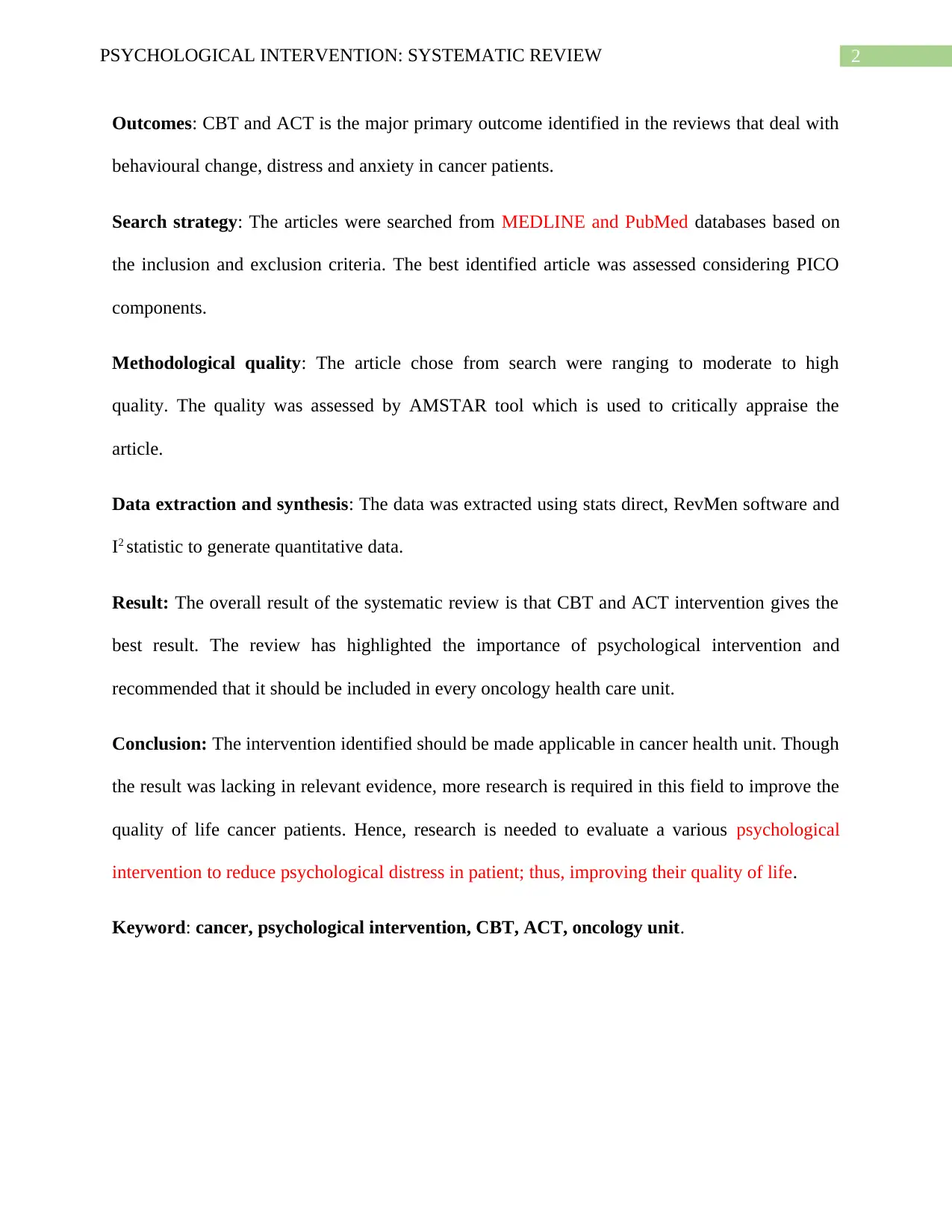
2PSYCHOLOGICAL INTERVENTION: SYSTEMATIC REVIEW
Outcomes: CBT and ACT is the major primary outcome identified in the reviews that deal with
behavioural change, distress and anxiety in cancer patients.
Search strategy: The articles were searched from MEDLINE and PubMed databases based on
the inclusion and exclusion criteria. The best identified article was assessed considering PICO
components.
Methodological quality: The article chose from search were ranging to moderate to high
quality. The quality was assessed by AMSTAR tool which is used to critically appraise the
article.
Data extraction and synthesis: The data was extracted using stats direct, RevMen software and
I2 statistic to generate quantitative data.
Result: The overall result of the systematic review is that CBT and ACT intervention gives the
best result. The review has highlighted the importance of psychological intervention and
recommended that it should be included in every oncology health care unit.
Conclusion: The intervention identified should be made applicable in cancer health unit. Though
the result was lacking in relevant evidence, more research is required in this field to improve the
quality of life cancer patients. Hence, research is needed to evaluate a various psychological
intervention to reduce psychological distress in patient; thus, improving their quality of life.
Keyword: cancer, psychological intervention, CBT, ACT, oncology unit.
Outcomes: CBT and ACT is the major primary outcome identified in the reviews that deal with
behavioural change, distress and anxiety in cancer patients.
Search strategy: The articles were searched from MEDLINE and PubMed databases based on
the inclusion and exclusion criteria. The best identified article was assessed considering PICO
components.
Methodological quality: The article chose from search were ranging to moderate to high
quality. The quality was assessed by AMSTAR tool which is used to critically appraise the
article.
Data extraction and synthesis: The data was extracted using stats direct, RevMen software and
I2 statistic to generate quantitative data.
Result: The overall result of the systematic review is that CBT and ACT intervention gives the
best result. The review has highlighted the importance of psychological intervention and
recommended that it should be included in every oncology health care unit.
Conclusion: The intervention identified should be made applicable in cancer health unit. Though
the result was lacking in relevant evidence, more research is required in this field to improve the
quality of life cancer patients. Hence, research is needed to evaluate a various psychological
intervention to reduce psychological distress in patient; thus, improving their quality of life.
Keyword: cancer, psychological intervention, CBT, ACT, oncology unit.
⊘ This is a preview!⊘
Do you want full access?
Subscribe today to unlock all pages.

Trusted by 1+ million students worldwide
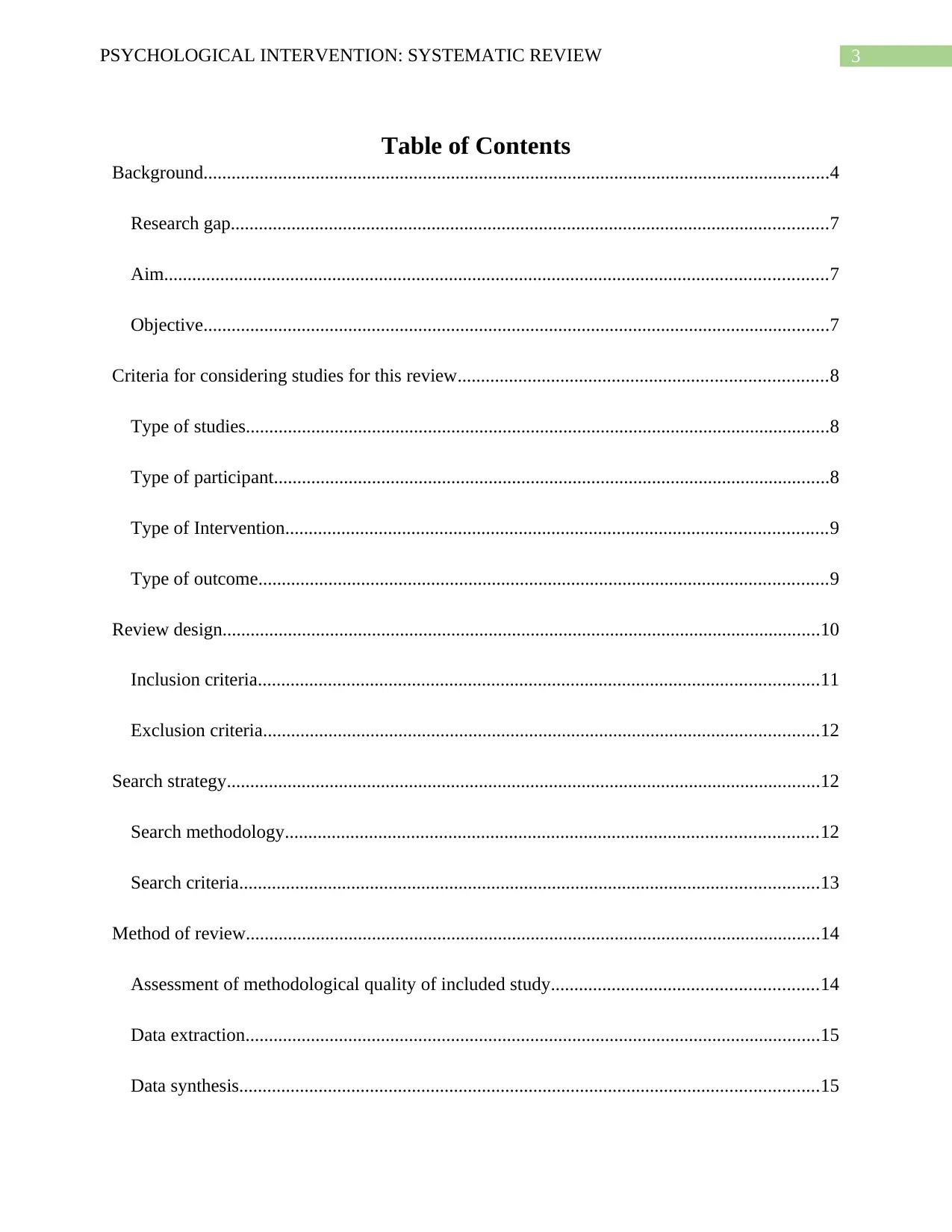
3PSYCHOLOGICAL INTERVENTION: SYSTEMATIC REVIEW
Table of Contents
Background......................................................................................................................................4
Research gap................................................................................................................................7
Aim..............................................................................................................................................7
Objective......................................................................................................................................7
Criteria for considering studies for this review...............................................................................8
Type of studies.............................................................................................................................8
Type of participant.......................................................................................................................8
Type of Intervention....................................................................................................................9
Type of outcome..........................................................................................................................9
Review design................................................................................................................................10
Inclusion criteria........................................................................................................................11
Exclusion criteria.......................................................................................................................12
Search strategy...............................................................................................................................12
Search methodology..................................................................................................................12
Search criteria............................................................................................................................13
Method of review...........................................................................................................................14
Assessment of methodological quality of included study.........................................................14
Data extraction...........................................................................................................................15
Data synthesis............................................................................................................................15
Table of Contents
Background......................................................................................................................................4
Research gap................................................................................................................................7
Aim..............................................................................................................................................7
Objective......................................................................................................................................7
Criteria for considering studies for this review...............................................................................8
Type of studies.............................................................................................................................8
Type of participant.......................................................................................................................8
Type of Intervention....................................................................................................................9
Type of outcome..........................................................................................................................9
Review design................................................................................................................................10
Inclusion criteria........................................................................................................................11
Exclusion criteria.......................................................................................................................12
Search strategy...............................................................................................................................12
Search methodology..................................................................................................................12
Search criteria............................................................................................................................13
Method of review...........................................................................................................................14
Assessment of methodological quality of included study.........................................................14
Data extraction...........................................................................................................................15
Data synthesis............................................................................................................................15
Paraphrase This Document
Need a fresh take? Get an instant paraphrase of this document with our AI Paraphraser
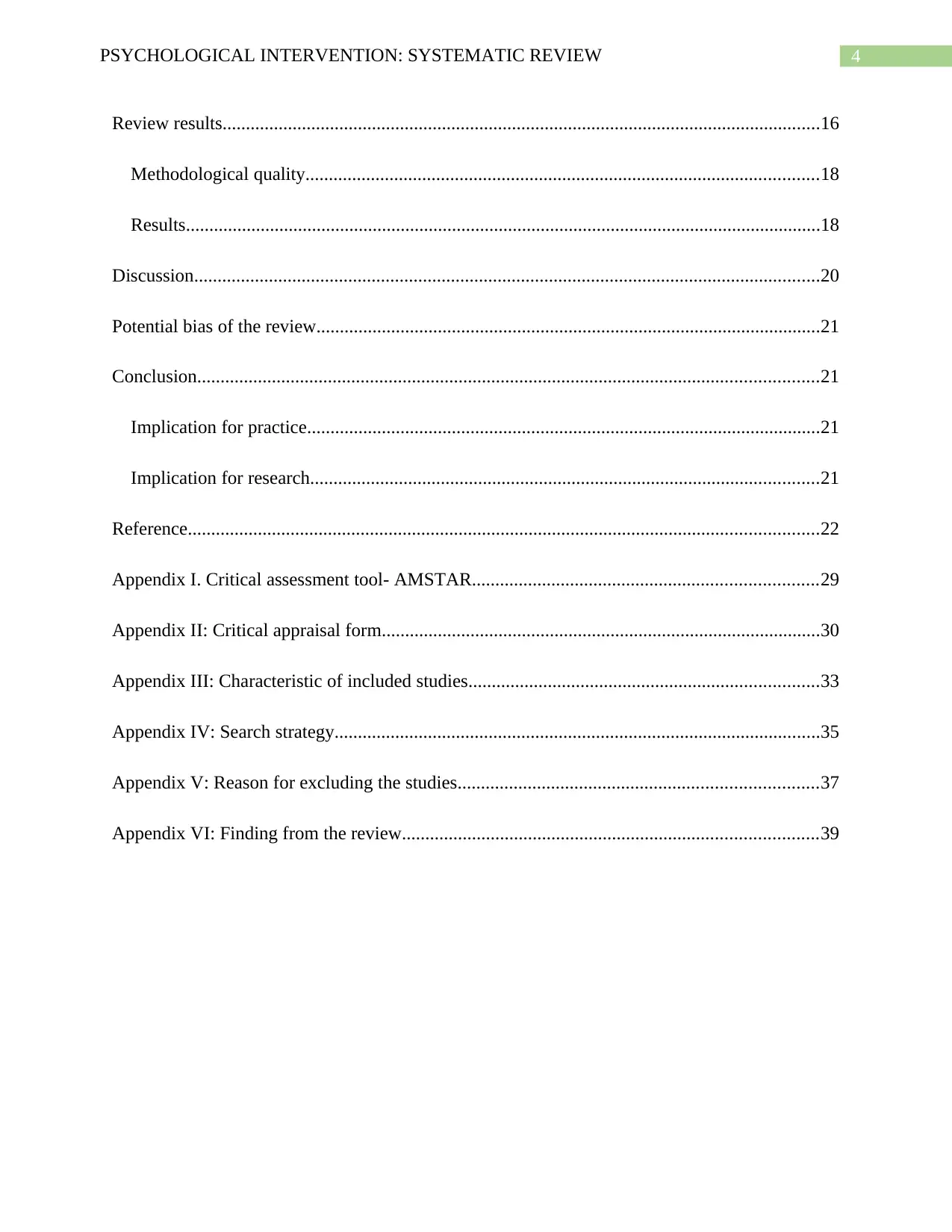
4PSYCHOLOGICAL INTERVENTION: SYSTEMATIC REVIEW
Review results................................................................................................................................16
Methodological quality..............................................................................................................18
Results........................................................................................................................................18
Discussion......................................................................................................................................20
Potential bias of the review............................................................................................................21
Conclusion.....................................................................................................................................21
Implication for practice..............................................................................................................21
Implication for research.............................................................................................................21
Reference.......................................................................................................................................22
Appendix I. Critical assessment tool- AMSTAR..........................................................................29
Appendix II: Critical appraisal form..............................................................................................30
Appendix III: Characteristic of included studies...........................................................................33
Appendix IV: Search strategy........................................................................................................35
Appendix V: Reason for excluding the studies.............................................................................37
Appendix VI: Finding from the review.........................................................................................39
Review results................................................................................................................................16
Methodological quality..............................................................................................................18
Results........................................................................................................................................18
Discussion......................................................................................................................................20
Potential bias of the review............................................................................................................21
Conclusion.....................................................................................................................................21
Implication for practice..............................................................................................................21
Implication for research.............................................................................................................21
Reference.......................................................................................................................................22
Appendix I. Critical assessment tool- AMSTAR..........................................................................29
Appendix II: Critical appraisal form..............................................................................................30
Appendix III: Characteristic of included studies...........................................................................33
Appendix IV: Search strategy........................................................................................................35
Appendix V: Reason for excluding the studies.............................................................................37
Appendix VI: Finding from the review.........................................................................................39
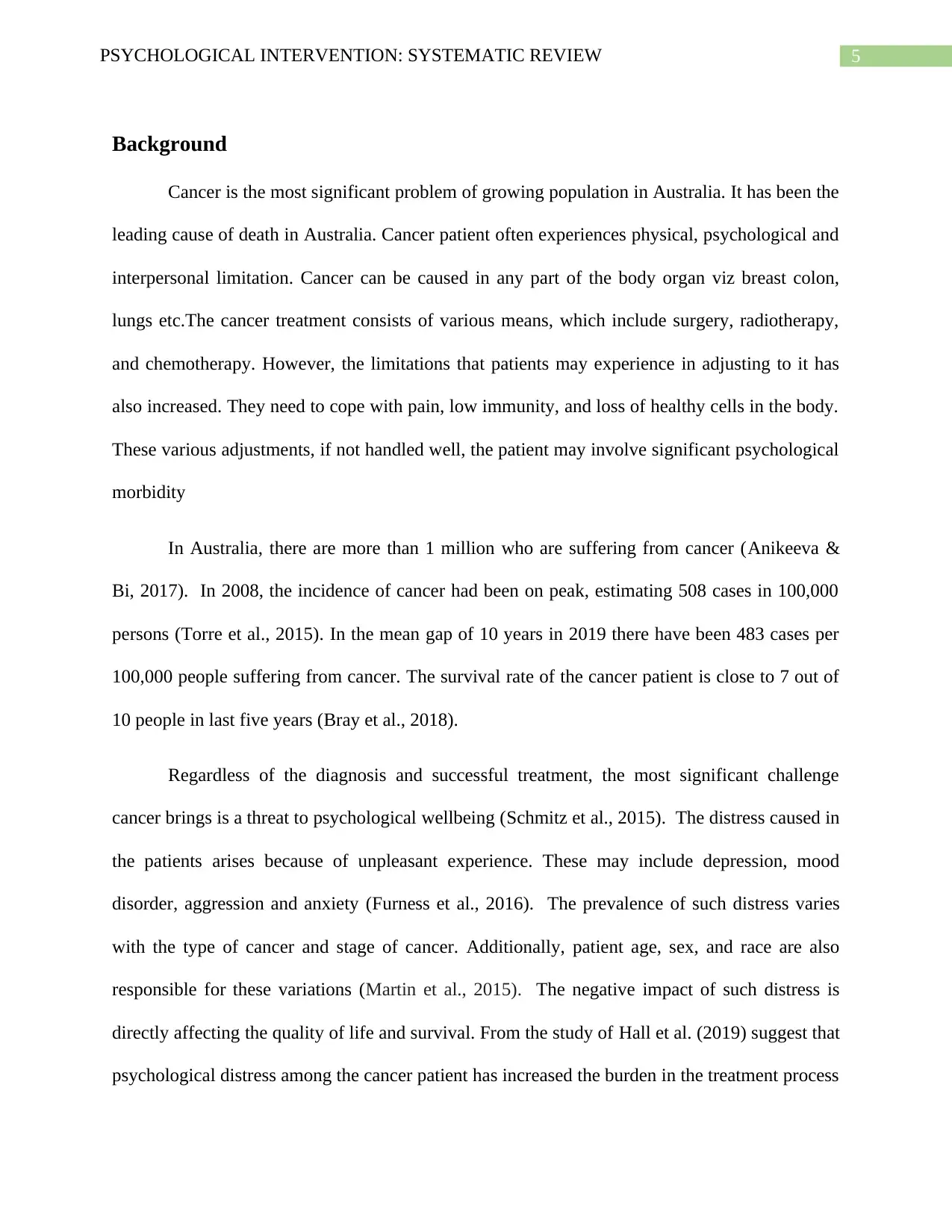
5PSYCHOLOGICAL INTERVENTION: SYSTEMATIC REVIEW
Background
Cancer is the most significant problem of growing population in Australia. It has been the
leading cause of death in Australia. Cancer patient often experiences physical, psychological and
interpersonal limitation. Cancer can be caused in any part of the body organ viz breast colon,
lungs etc.The cancer treatment consists of various means, which include surgery, radiotherapy,
and chemotherapy. However, the limitations that patients may experience in adjusting to it has
also increased. They need to cope with pain, low immunity, and loss of healthy cells in the body.
These various adjustments, if not handled well, the patient may involve significant psychological
morbidity
In Australia, there are more than 1 million who are suffering from cancer (Anikeeva &
Bi, 2017). In 2008, the incidence of cancer had been on peak, estimating 508 cases in 100,000
persons (Torre et al., 2015). In the mean gap of 10 years in 2019 there have been 483 cases per
100,000 people suffering from cancer. The survival rate of the cancer patient is close to 7 out of
10 people in last five years (Bray et al., 2018).
Regardless of the diagnosis and successful treatment, the most significant challenge
cancer brings is a threat to psychological wellbeing (Schmitz et al., 2015). The distress caused in
the patients arises because of unpleasant experience. These may include depression, mood
disorder, aggression and anxiety (Furness et al., 2016). The prevalence of such distress varies
with the type of cancer and stage of cancer. Additionally, patient age, sex, and race are also
responsible for these variations (Martin et al., 2015). The negative impact of such distress is
directly affecting the quality of life and survival. From the study of Hall et al. (2019) suggest that
psychological distress among the cancer patient has increased the burden in the treatment process
Background
Cancer is the most significant problem of growing population in Australia. It has been the
leading cause of death in Australia. Cancer patient often experiences physical, psychological and
interpersonal limitation. Cancer can be caused in any part of the body organ viz breast colon,
lungs etc.The cancer treatment consists of various means, which include surgery, radiotherapy,
and chemotherapy. However, the limitations that patients may experience in adjusting to it has
also increased. They need to cope with pain, low immunity, and loss of healthy cells in the body.
These various adjustments, if not handled well, the patient may involve significant psychological
morbidity
In Australia, there are more than 1 million who are suffering from cancer (Anikeeva &
Bi, 2017). In 2008, the incidence of cancer had been on peak, estimating 508 cases in 100,000
persons (Torre et al., 2015). In the mean gap of 10 years in 2019 there have been 483 cases per
100,000 people suffering from cancer. The survival rate of the cancer patient is close to 7 out of
10 people in last five years (Bray et al., 2018).
Regardless of the diagnosis and successful treatment, the most significant challenge
cancer brings is a threat to psychological wellbeing (Schmitz et al., 2015). The distress caused in
the patients arises because of unpleasant experience. These may include depression, mood
disorder, aggression and anxiety (Furness et al., 2016). The prevalence of such distress varies
with the type of cancer and stage of cancer. Additionally, patient age, sex, and race are also
responsible for these variations (Martin et al., 2015). The negative impact of such distress is
directly affecting the quality of life and survival. From the study of Hall et al. (2019) suggest that
psychological distress among the cancer patient has increased the burden in the treatment process
⊘ This is a preview!⊘
Do you want full access?
Subscribe today to unlock all pages.

Trusted by 1+ million students worldwide
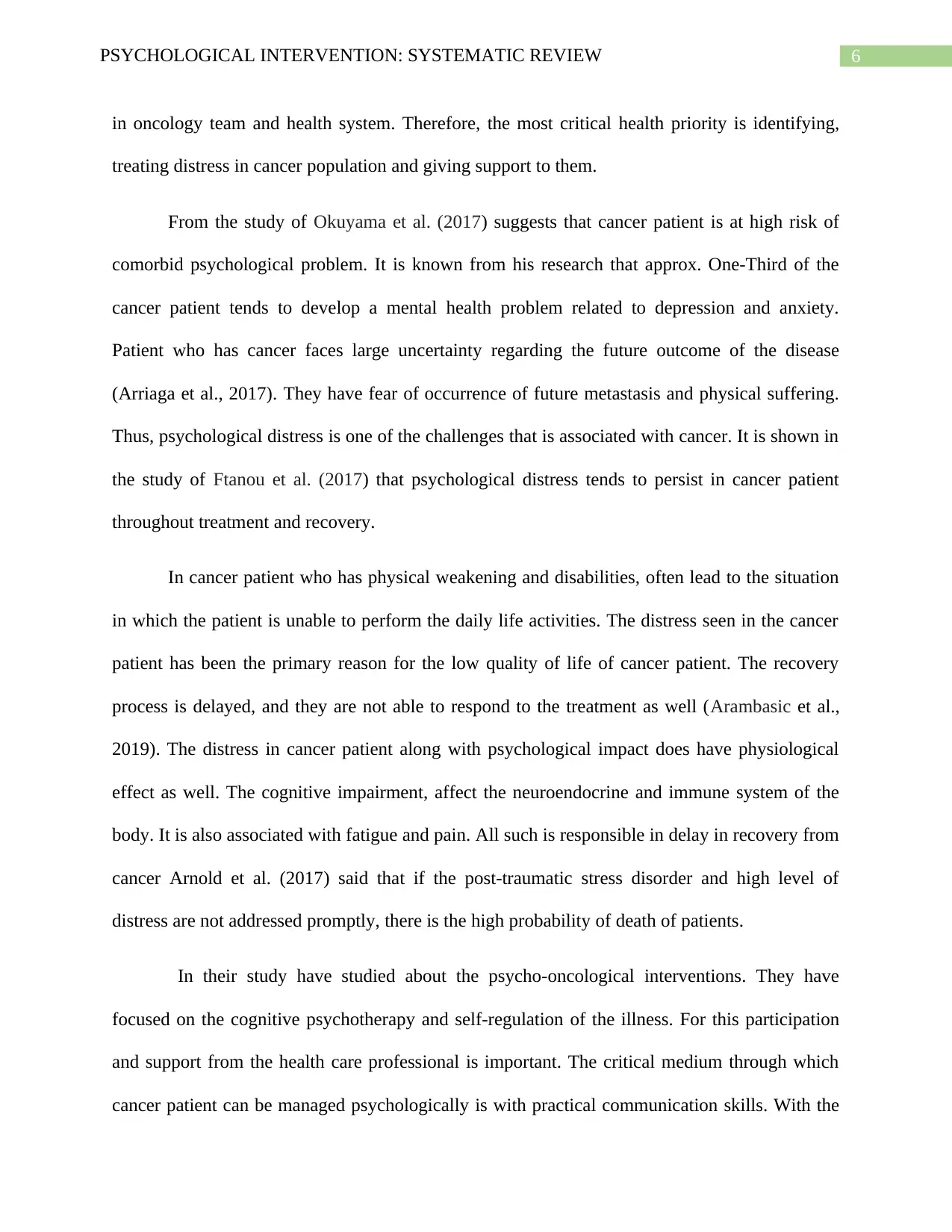
6PSYCHOLOGICAL INTERVENTION: SYSTEMATIC REVIEW
in oncology team and health system. Therefore, the most critical health priority is identifying,
treating distress in cancer population and giving support to them.
From the study of Okuyama et al. (2017) suggests that cancer patient is at high risk of
comorbid psychological problem. It is known from his research that approx. One-Third of the
cancer patient tends to develop a mental health problem related to depression and anxiety.
Patient who has cancer faces large uncertainty regarding the future outcome of the disease
(Arriaga et al., 2017). They have fear of occurrence of future metastasis and physical suffering.
Thus, psychological distress is one of the challenges that is associated with cancer. It is shown in
the study of Ftanou et al. (2017) that psychological distress tends to persist in cancer patient
throughout treatment and recovery.
In cancer patient who has physical weakening and disabilities, often lead to the situation
in which the patient is unable to perform the daily life activities. The distress seen in the cancer
patient has been the primary reason for the low quality of life of cancer patient. The recovery
process is delayed, and they are not able to respond to the treatment as well (Arambasic et al.,
2019). The distress in cancer patient along with psychological impact does have physiological
effect as well. The cognitive impairment, affect the neuroendocrine and immune system of the
body. It is also associated with fatigue and pain. All such is responsible in delay in recovery from
cancer Arnold et al. (2017) said that if the post-traumatic stress disorder and high level of
distress are not addressed promptly, there is the high probability of death of patients.
In their study have studied about the psycho-oncological interventions. They have
focused on the cognitive psychotherapy and self-regulation of the illness. For this participation
and support from the health care professional is important. The critical medium through which
cancer patient can be managed psychologically is with practical communication skills. With the
in oncology team and health system. Therefore, the most critical health priority is identifying,
treating distress in cancer population and giving support to them.
From the study of Okuyama et al. (2017) suggests that cancer patient is at high risk of
comorbid psychological problem. It is known from his research that approx. One-Third of the
cancer patient tends to develop a mental health problem related to depression and anxiety.
Patient who has cancer faces large uncertainty regarding the future outcome of the disease
(Arriaga et al., 2017). They have fear of occurrence of future metastasis and physical suffering.
Thus, psychological distress is one of the challenges that is associated with cancer. It is shown in
the study of Ftanou et al. (2017) that psychological distress tends to persist in cancer patient
throughout treatment and recovery.
In cancer patient who has physical weakening and disabilities, often lead to the situation
in which the patient is unable to perform the daily life activities. The distress seen in the cancer
patient has been the primary reason for the low quality of life of cancer patient. The recovery
process is delayed, and they are not able to respond to the treatment as well (Arambasic et al.,
2019). The distress in cancer patient along with psychological impact does have physiological
effect as well. The cognitive impairment, affect the neuroendocrine and immune system of the
body. It is also associated with fatigue and pain. All such is responsible in delay in recovery from
cancer Arnold et al. (2017) said that if the post-traumatic stress disorder and high level of
distress are not addressed promptly, there is the high probability of death of patients.
In their study have studied about the psycho-oncological interventions. They have
focused on the cognitive psychotherapy and self-regulation of the illness. For this participation
and support from the health care professional is important. The critical medium through which
cancer patient can be managed psychologically is with practical communication skills. With the
Paraphrase This Document
Need a fresh take? Get an instant paraphrase of this document with our AI Paraphraser
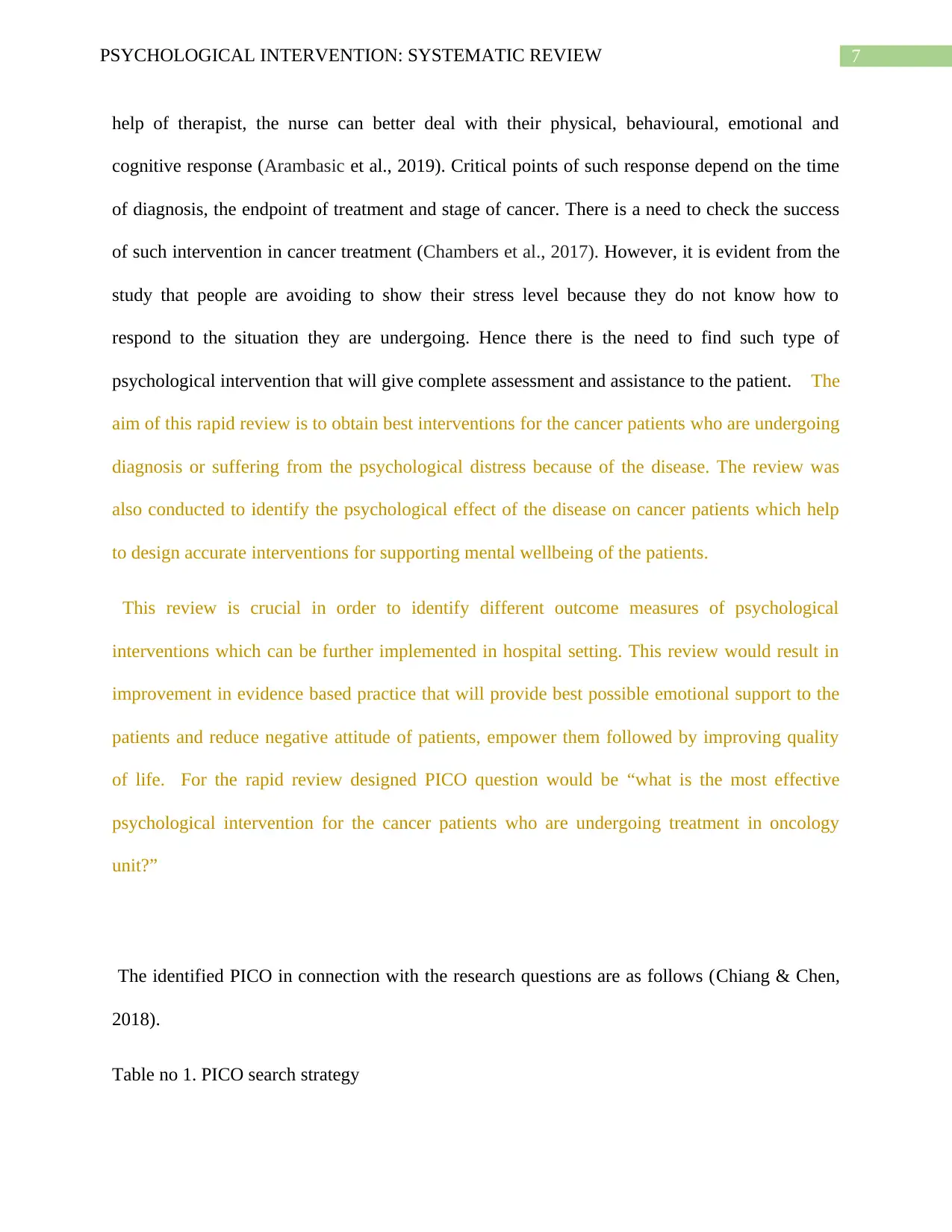
7PSYCHOLOGICAL INTERVENTION: SYSTEMATIC REVIEW
help of therapist, the nurse can better deal with their physical, behavioural, emotional and
cognitive response (Arambasic et al., 2019). Critical points of such response depend on the time
of diagnosis, the endpoint of treatment and stage of cancer. There is a need to check the success
of such intervention in cancer treatment (Chambers et al., 2017). However, it is evident from the
study that people are avoiding to show their stress level because they do not know how to
respond to the situation they are undergoing. Hence there is the need to find such type of
psychological intervention that will give complete assessment and assistance to the patient. The
aim of this rapid review is to obtain best interventions for the cancer patients who are undergoing
diagnosis or suffering from the psychological distress because of the disease. The review was
also conducted to identify the psychological effect of the disease on cancer patients which help
to design accurate interventions for supporting mental wellbeing of the patients.
This review is crucial in order to identify different outcome measures of psychological
interventions which can be further implemented in hospital setting. This review would result in
improvement in evidence based practice that will provide best possible emotional support to the
patients and reduce negative attitude of patients, empower them followed by improving quality
of life. For the rapid review designed PICO question would be “what is the most effective
psychological intervention for the cancer patients who are undergoing treatment in oncology
unit?”
The identified PICO in connection with the research questions are as follows (Chiang & Chen,
2018).
Table no 1. PICO search strategy
help of therapist, the nurse can better deal with their physical, behavioural, emotional and
cognitive response (Arambasic et al., 2019). Critical points of such response depend on the time
of diagnosis, the endpoint of treatment and stage of cancer. There is a need to check the success
of such intervention in cancer treatment (Chambers et al., 2017). However, it is evident from the
study that people are avoiding to show their stress level because they do not know how to
respond to the situation they are undergoing. Hence there is the need to find such type of
psychological intervention that will give complete assessment and assistance to the patient. The
aim of this rapid review is to obtain best interventions for the cancer patients who are undergoing
diagnosis or suffering from the psychological distress because of the disease. The review was
also conducted to identify the psychological effect of the disease on cancer patients which help
to design accurate interventions for supporting mental wellbeing of the patients.
This review is crucial in order to identify different outcome measures of psychological
interventions which can be further implemented in hospital setting. This review would result in
improvement in evidence based practice that will provide best possible emotional support to the
patients and reduce negative attitude of patients, empower them followed by improving quality
of life. For the rapid review designed PICO question would be “what is the most effective
psychological intervention for the cancer patients who are undergoing treatment in oncology
unit?”
The identified PICO in connection with the research questions are as follows (Chiang & Chen,
2018).
Table no 1. PICO search strategy
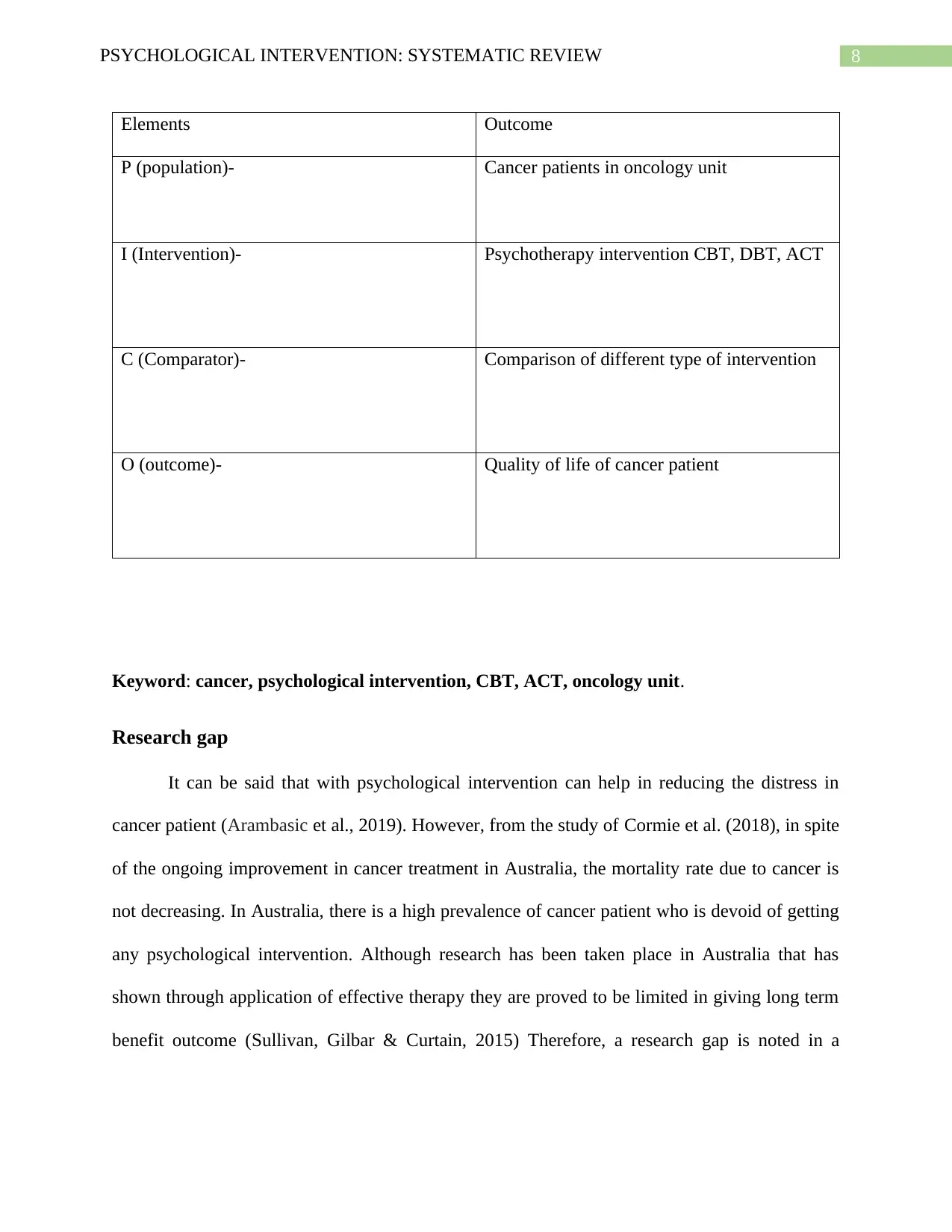
8PSYCHOLOGICAL INTERVENTION: SYSTEMATIC REVIEW
Elements Outcome
P (population)- Cancer patients in oncology unit
I (Intervention)- Psychotherapy intervention CBT, DBT, ACT
C (Comparator)- Comparison of different type of intervention
O (outcome)- Quality of life of cancer patient
Keyword: cancer, psychological intervention, CBT, ACT, oncology unit.
Research gap
It can be said that with psychological intervention can help in reducing the distress in
cancer patient (Arambasic et al., 2019). However, from the study of Cormie et al. (2018), in spite
of the ongoing improvement in cancer treatment in Australia, the mortality rate due to cancer is
not decreasing. In Australia, there is a high prevalence of cancer patient who is devoid of getting
any psychological intervention. Although research has been taken place in Australia that has
shown through application of effective therapy they are proved to be limited in giving long term
benefit outcome (Sullivan, Gilbar & Curtain, 2015) Therefore, a research gap is noted in a
Elements Outcome
P (population)- Cancer patients in oncology unit
I (Intervention)- Psychotherapy intervention CBT, DBT, ACT
C (Comparator)- Comparison of different type of intervention
O (outcome)- Quality of life of cancer patient
Keyword: cancer, psychological intervention, CBT, ACT, oncology unit.
Research gap
It can be said that with psychological intervention can help in reducing the distress in
cancer patient (Arambasic et al., 2019). However, from the study of Cormie et al. (2018), in spite
of the ongoing improvement in cancer treatment in Australia, the mortality rate due to cancer is
not decreasing. In Australia, there is a high prevalence of cancer patient who is devoid of getting
any psychological intervention. Although research has been taken place in Australia that has
shown through application of effective therapy they are proved to be limited in giving long term
benefit outcome (Sullivan, Gilbar & Curtain, 2015) Therefore, a research gap is noted in a
⊘ This is a preview!⊘
Do you want full access?
Subscribe today to unlock all pages.

Trusted by 1+ million students worldwide
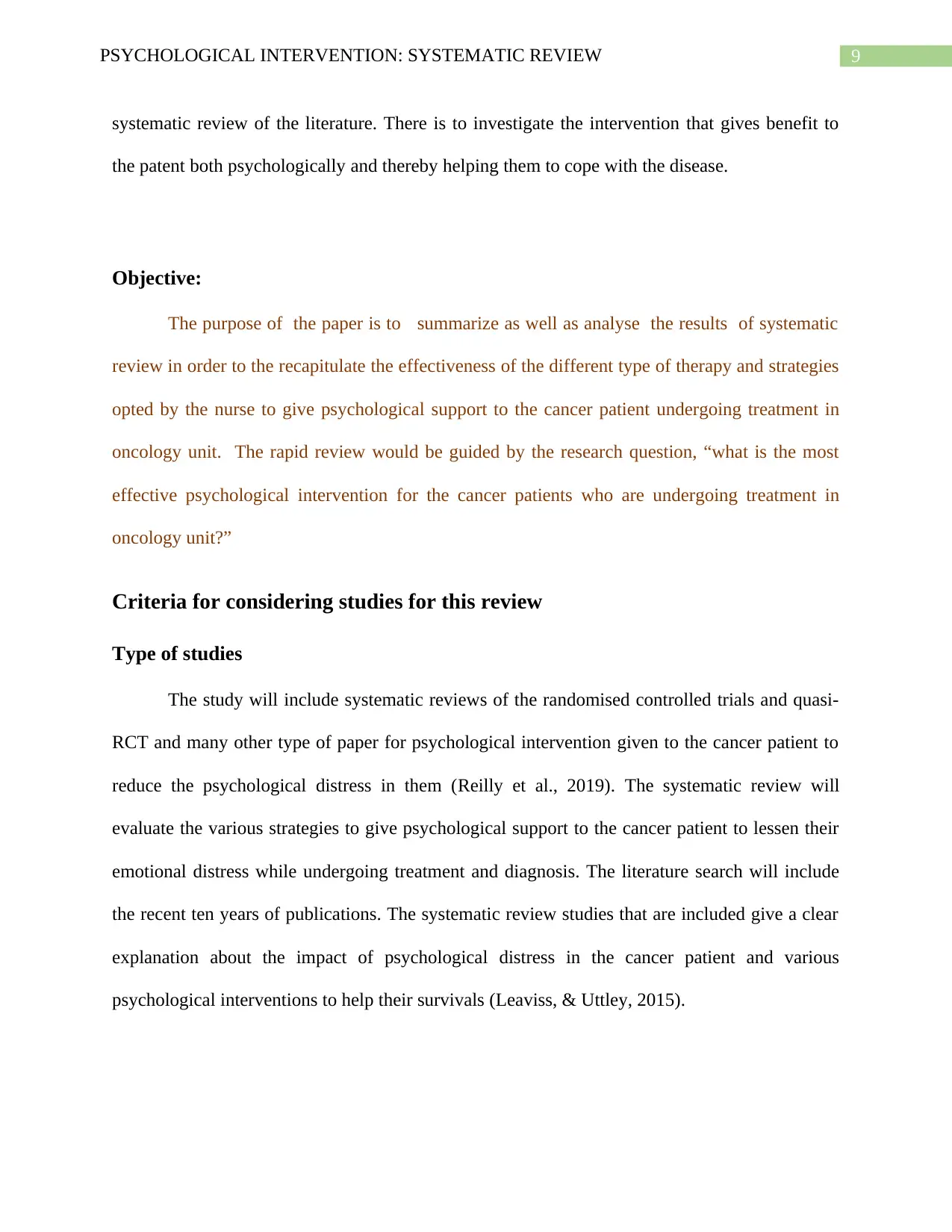
9PSYCHOLOGICAL INTERVENTION: SYSTEMATIC REVIEW
systematic review of the literature. There is to investigate the intervention that gives benefit to
the patent both psychologically and thereby helping them to cope with the disease.
Objective:
The purpose of the paper is to summarize as well as analyse the results of systematic
review in order to the recapitulate the effectiveness of the different type of therapy and strategies
opted by the nurse to give psychological support to the cancer patient undergoing treatment in
oncology unit. The rapid review would be guided by the research question, “what is the most
effective psychological intervention for the cancer patients who are undergoing treatment in
oncology unit?”
Criteria for considering studies for this review
Type of studies
The study will include systematic reviews of the randomised controlled trials and quasi-
RCT and many other type of paper for psychological intervention given to the cancer patient to
reduce the psychological distress in them (Reilly et al., 2019). The systematic review will
evaluate the various strategies to give psychological support to the cancer patient to lessen their
emotional distress while undergoing treatment and diagnosis. The literature search will include
the recent ten years of publications. The systematic review studies that are included give a clear
explanation about the impact of psychological distress in the cancer patient and various
psychological interventions to help their survivals (Leaviss, & Uttley, 2015).
systematic review of the literature. There is to investigate the intervention that gives benefit to
the patent both psychologically and thereby helping them to cope with the disease.
Objective:
The purpose of the paper is to summarize as well as analyse the results of systematic
review in order to the recapitulate the effectiveness of the different type of therapy and strategies
opted by the nurse to give psychological support to the cancer patient undergoing treatment in
oncology unit. The rapid review would be guided by the research question, “what is the most
effective psychological intervention for the cancer patients who are undergoing treatment in
oncology unit?”
Criteria for considering studies for this review
Type of studies
The study will include systematic reviews of the randomised controlled trials and quasi-
RCT and many other type of paper for psychological intervention given to the cancer patient to
reduce the psychological distress in them (Reilly et al., 2019). The systematic review will
evaluate the various strategies to give psychological support to the cancer patient to lessen their
emotional distress while undergoing treatment and diagnosis. The literature search will include
the recent ten years of publications. The systematic review studies that are included give a clear
explanation about the impact of psychological distress in the cancer patient and various
psychological interventions to help their survivals (Leaviss, & Uttley, 2015).
Paraphrase This Document
Need a fresh take? Get an instant paraphrase of this document with our AI Paraphraser
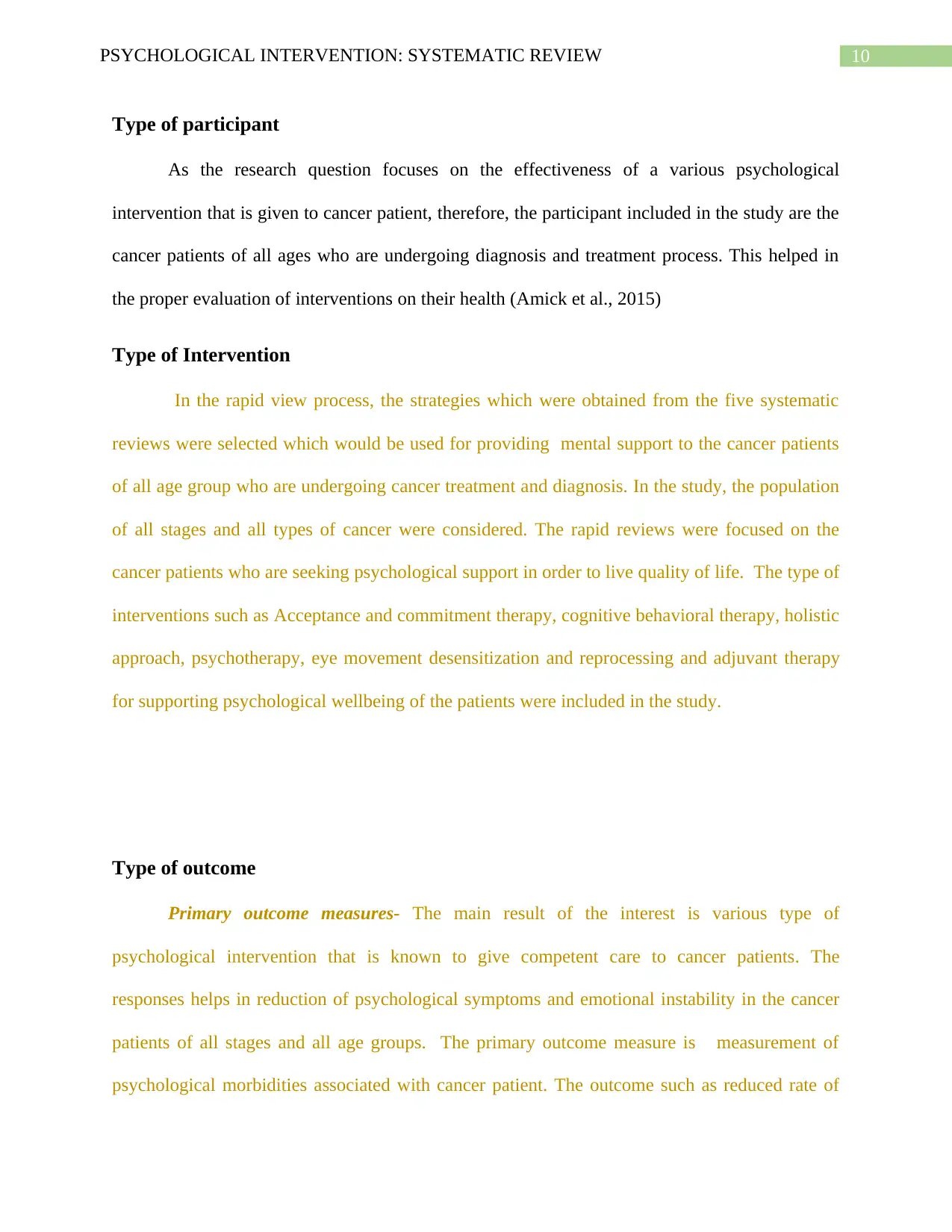
10PSYCHOLOGICAL INTERVENTION: SYSTEMATIC REVIEW
Type of participant
As the research question focuses on the effectiveness of a various psychological
intervention that is given to cancer patient, therefore, the participant included in the study are the
cancer patients of all ages who are undergoing diagnosis and treatment process. This helped in
the proper evaluation of interventions on their health (Amick et al., 2015)
Type of Intervention
In the rapid view process, the strategies which were obtained from the five systematic
reviews were selected which would be used for providing mental support to the cancer patients
of all age group who are undergoing cancer treatment and diagnosis. In the study, the population
of all stages and all types of cancer were considered. The rapid reviews were focused on the
cancer patients who are seeking psychological support in order to live quality of life. The type of
interventions such as Acceptance and commitment therapy, cognitive behavioral therapy, holistic
approach, psychotherapy, eye movement desensitization and reprocessing and adjuvant therapy
for supporting psychological wellbeing of the patients were included in the study.
Type of outcome
Primary outcome measures- The main result of the interest is various type of
psychological intervention that is known to give competent care to cancer patients. The
responses helps in reduction of psychological symptoms and emotional instability in the cancer
patients of all stages and all age groups. The primary outcome measure is measurement of
psychological morbidities associated with cancer patient. The outcome such as reduced rate of
Type of participant
As the research question focuses on the effectiveness of a various psychological
intervention that is given to cancer patient, therefore, the participant included in the study are the
cancer patients of all ages who are undergoing diagnosis and treatment process. This helped in
the proper evaluation of interventions on their health (Amick et al., 2015)
Type of Intervention
In the rapid view process, the strategies which were obtained from the five systematic
reviews were selected which would be used for providing mental support to the cancer patients
of all age group who are undergoing cancer treatment and diagnosis. In the study, the population
of all stages and all types of cancer were considered. The rapid reviews were focused on the
cancer patients who are seeking psychological support in order to live quality of life. The type of
interventions such as Acceptance and commitment therapy, cognitive behavioral therapy, holistic
approach, psychotherapy, eye movement desensitization and reprocessing and adjuvant therapy
for supporting psychological wellbeing of the patients were included in the study.
Type of outcome
Primary outcome measures- The main result of the interest is various type of
psychological intervention that is known to give competent care to cancer patients. The
responses helps in reduction of psychological symptoms and emotional instability in the cancer
patients of all stages and all age groups. The primary outcome measure is measurement of
psychological morbidities associated with cancer patient. The outcome such as reduced rate of
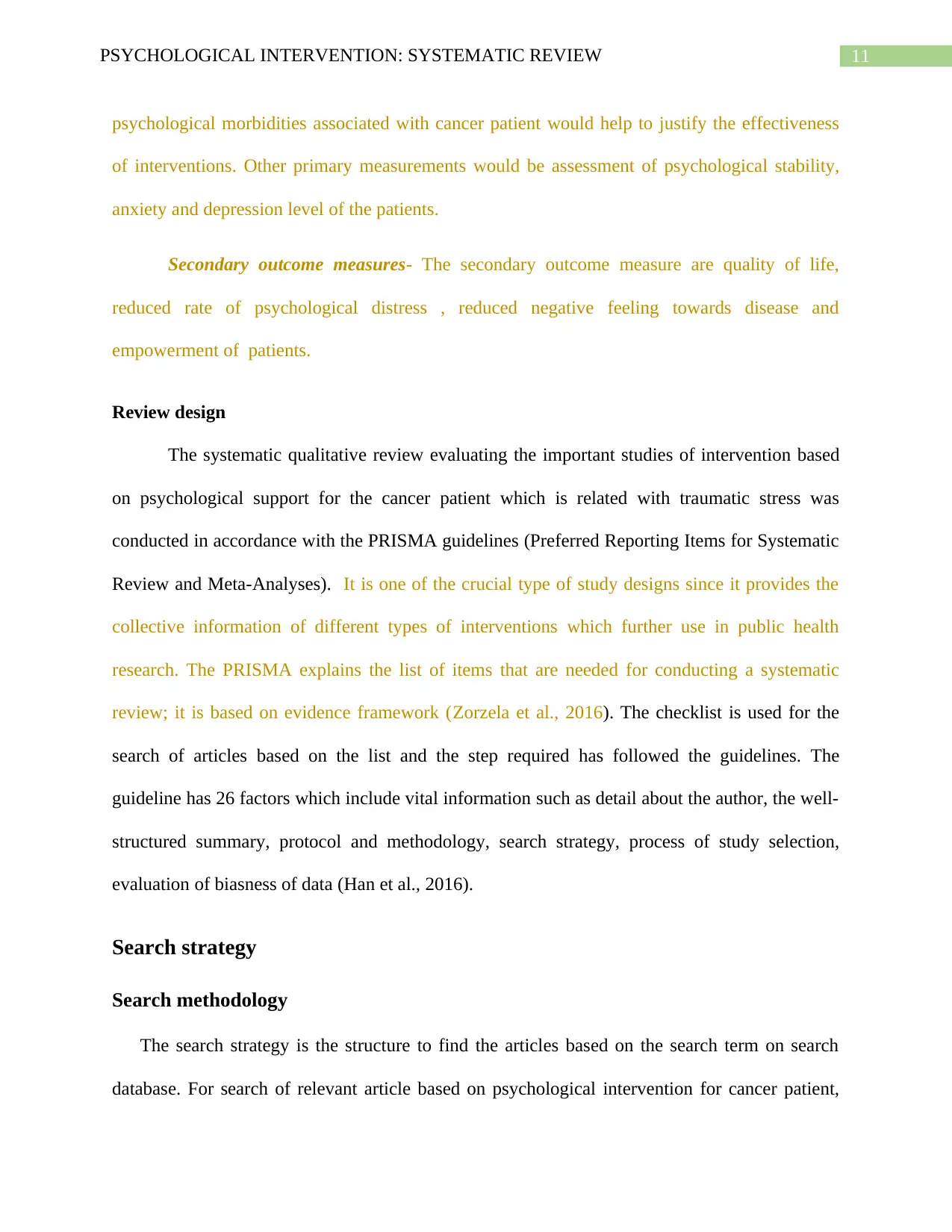
11PSYCHOLOGICAL INTERVENTION: SYSTEMATIC REVIEW
psychological morbidities associated with cancer patient would help to justify the effectiveness
of interventions. Other primary measurements would be assessment of psychological stability,
anxiety and depression level of the patients.
Secondary outcome measures- The secondary outcome measure are quality of life,
reduced rate of psychological distress , reduced negative feeling towards disease and
empowerment of patients.
Review design
The systematic qualitative review evaluating the important studies of intervention based
on psychological support for the cancer patient which is related with traumatic stress was
conducted in accordance with the PRISMA guidelines (Preferred Reporting Items for Systematic
Review and Meta-Analyses). It is one of the crucial type of study designs since it provides the
collective information of different types of interventions which further use in public health
research. The PRISMA explains the list of items that are needed for conducting a systematic
review; it is based on evidence framework (Zorzela et al., 2016). The checklist is used for the
search of articles based on the list and the step required has followed the guidelines. The
guideline has 26 factors which include vital information such as detail about the author, the well-
structured summary, protocol and methodology, search strategy, process of study selection,
evaluation of biasness of data (Han et al., 2016).
Search strategy
Search methodology
The search strategy is the structure to find the articles based on the search term on search
database. For search of relevant article based on psychological intervention for cancer patient,
psychological morbidities associated with cancer patient would help to justify the effectiveness
of interventions. Other primary measurements would be assessment of psychological stability,
anxiety and depression level of the patients.
Secondary outcome measures- The secondary outcome measure are quality of life,
reduced rate of psychological distress , reduced negative feeling towards disease and
empowerment of patients.
Review design
The systematic qualitative review evaluating the important studies of intervention based
on psychological support for the cancer patient which is related with traumatic stress was
conducted in accordance with the PRISMA guidelines (Preferred Reporting Items for Systematic
Review and Meta-Analyses). It is one of the crucial type of study designs since it provides the
collective information of different types of interventions which further use in public health
research. The PRISMA explains the list of items that are needed for conducting a systematic
review; it is based on evidence framework (Zorzela et al., 2016). The checklist is used for the
search of articles based on the list and the step required has followed the guidelines. The
guideline has 26 factors which include vital information such as detail about the author, the well-
structured summary, protocol and methodology, search strategy, process of study selection,
evaluation of biasness of data (Han et al., 2016).
Search strategy
Search methodology
The search strategy is the structure to find the articles based on the search term on search
database. For search of relevant article based on psychological intervention for cancer patient,
⊘ This is a preview!⊘
Do you want full access?
Subscribe today to unlock all pages.

Trusted by 1+ million students worldwide
1 out of 48
Related Documents
Your All-in-One AI-Powered Toolkit for Academic Success.
+13062052269
info@desklib.com
Available 24*7 on WhatsApp / Email
![[object Object]](/_next/static/media/star-bottom.7253800d.svg)
Unlock your academic potential
Copyright © 2020–2026 A2Z Services. All Rights Reserved. Developed and managed by ZUCOL.





